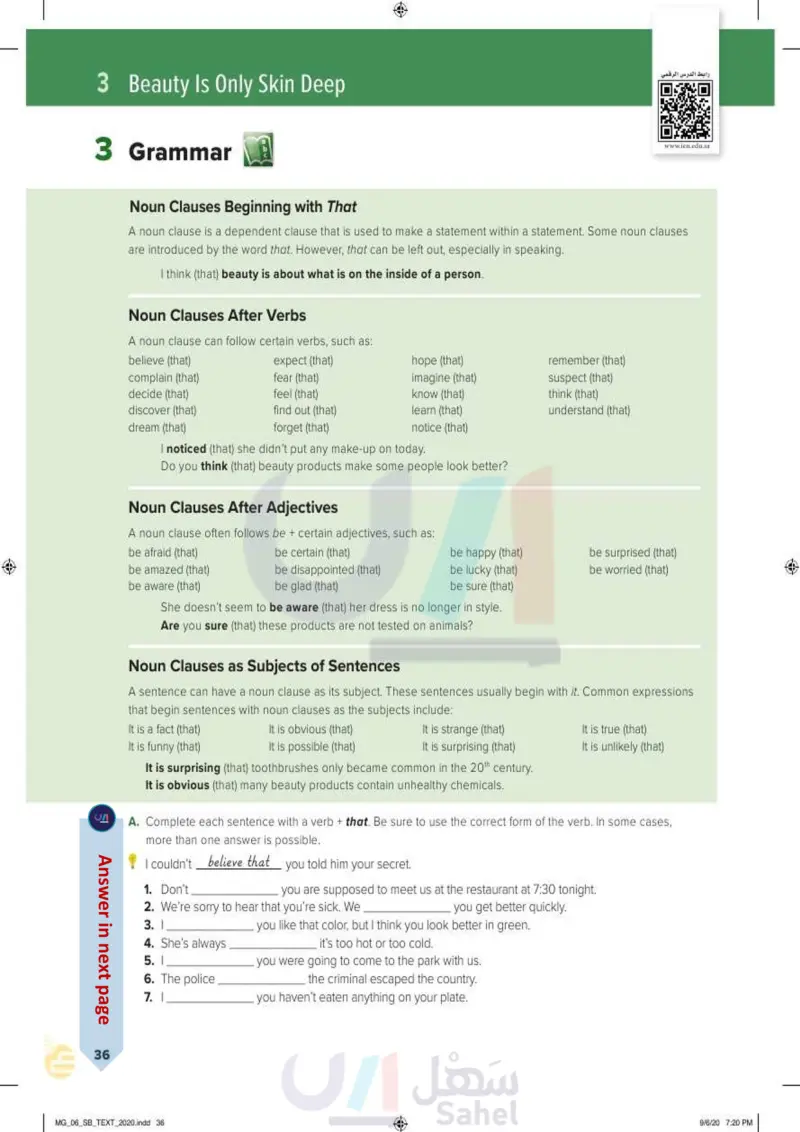Grammar - Mega goal 3 - ثالث ثانوي
Term 1
Unit1: Two Is Better Than One
Unit2: influential people
Unit3: What Will They Think of Next
Unit4: The World of TV
Term 2
Unit5: Do You Really Need It
Unit6: The Gender Divide
unit7: Everyone Makes Mistakes
unit8: Against the Odds
Term 3
unit9: Beauty Is Only Skin Deep
unit10: They Said, We Said
unit11: Express Yourself
unit12: Lost and Found
O 9 Beauty Is Only Skin Deep 3 Grammar Noun Clauses Beginning with That رابط الدرس الرقمي www.ien.edu.sa A noun clause is a dependent clause that is used to make a statement within a statement. Some noun clauses are introduced by the word that. However, that can be left out, especially in speaking. I think (that) beauty is about what is on the inside of a person. Noun Clauses After Verbs A noun clause can follow certain verbs, such as: وزارة التعليم Ministry of40ation 2024-1446 believe (that) complain (that) decide (that) discover (that) dream (that) expect (that) fear (that) feel (that) find out (that) forget (that) hope (that) imagine (that) know (that) learn (that) notice (that) I noticed (that) she didn't put any make-up on today. Do you think (that) beauty products make some people look better? Noun Clauses After Adjectives A noun clause often follows be + certain adjectives, such as: be afraid (that) be amazed (that) be certain (that) be disappointed (that) remember (that) suspect (that) think (that) understand (that) be happy (that) be lucky (that) be surprised (that) be worried (that) be aware (that) be glad (that) be sure (that) She doesn't seem to be aware (that) her dress is no longer in style. Are you sure (that) these products are not tested on animals? Noun Clauses as Subjects of Sentences A sentence can have a noun clause as its subject. These sentences usually begin with it. Common expressions that begin sentences with noun clauses as the subjects include: It is a fact (that) It is funny (that) It is obvious (that) It is possible (that) It is strange (that) It is surprising (that) It is true (that) It is unlikely (that) It is surprising (that) toothbrushes only became common in the 20th century. It is obvious (that) many beauty products contain unhealthy chemicals. A. Complete each sentence with a verb + that. Be sure to use the correct form of the verb. In some cases, more than one answer is possible. I couldn't believe that you told him your secret. 1. Don't you are supposed to meet us at the restaurant at 7:30 tonight. 2. We're sorry to hear that you're sick. We you get better quickly. 3. I 4. She's always 5. I 6. The police 7. 1 you like that color, but I think you look better in green. it's too hot or too cold. you were going to come to the park with us. the criminal escaped the country. you haven't eaten anything on your plate. MG_03_COMBO_TEXT_2024.indb 140 30/4/24 3:06 AM

Noun Clauses Beginning with That
Complete each sentence with a verb+ that Be sure to use the correct form of the verb. In some cases secret 1. Don't ....... you are supposed to meet us at the restaurant at 7.30 tonight
O B. Read and respond to each item. Include a noun clause in your response. Talk about something you learned recently. I recently learned that a communications company once rejected Alexander Graham Bell's idea. 1. Talk about something you saw recently. 2. Talk about a complaint you made recently. 3. Talk about a decision you made recently. 4. Talk about something you believe. 5. Talk about a dream you have for the future. 6. Talk about something you will always remember. 7. Talk about something you expect to happen in the future. 8. Talk about something people often forget. C. Combine the ideas in each pair of sentences into one sentence. Use a noun clause. The next bus is due to arrive at 6:00. I'm sure of it. I'm sure that the next bus is due to arrive at 6:00. 1. She's worried. She thinks she's going to fail the class. 2. We're going to have a mid-term exam. Are you aware of that? 3. We're lucky. We had good weather for the picnic. 4. He drove all the way here from his house. I'm amazed. 5. Joanne passed the exam. I'm certain. 6. He didn't get the job. He's really disappointed. 7. The summer is finally here. I'm glad about that. 8. Don't you like coffee? I'm surprised. D. Look at the picture. Describe the scene and how you think each person feels. Use noun clauses. وزارة التعليم Ministry of Education 2024-1446 MG_03_COMBO_TEXT_2024.indb 141 141 30/4/24 3:06 AM

Read and respond to each item Include a noun clause in your response 1. Talk about something you saw recently
Combine the ideas in each pair of sentences into one sentence. Use a noun clause 1. She's worried. She thinks she's going to fail the class
Look at the picture Describe the scene and how you think each person feels. Use noun clauses













